Kabimustine is a prescription medication that contains 100mg of Bendamustine, a nitrogen mustard compound. It is available in injectable form and is used to treat chronic lymphocytic leukemia (CLL) and indolent non-Hodgkin’s lymphoma (NHL).
Composition:
Kabimustine contains 100mg of Bendamustine, a white or off-white powder.
Mechanism of Action:
Bendamustine works by:
- Alkylating DNA, which prevents the replication of cancer cells
- Interfering with the repair of DNA damage, which can lead to cell death
- Inducing apoptosis (cell death) in cancer cells
Indication:
Kabimustine is indicated for the treatment of:
- Chronic lymphocytic leukemia (CLL)
- Indolent non-Hodgkin’s lymphoma (NHL)
Dosage:
The recommended dosage of Kabimustine is:
- 100mg/m² intravenously over 30 minutes every 4 weeks for up to 6 cycles
Side Effects:
Common side effects of Kabimustine may include:
- Nausea
- Vomiting
- Diarrhea
- Fatigue
- Headache
- Fever
- Chills
- Increased risk of infections
- Hematological toxicity (anemia, neutropenia, thrombocytopenia)
- Cardiac toxicity (cardiomyopathy, arrhythmias)
- Gastrointestinal toxicity (stomatitis, esophagitis)
Recommendation:
Kabimustine should only be used under the guidance of a healthcare provider. Patients receiving Kabimustine treatment should be closely monitored for side effects and potential complications.
Important Note:
- Kabimustine is a potent medication that can cause serious side effects, including hematological toxicity and cardiac toxicity. Patients should be closely monitored for these side effects.
- Patients should not take Kabimustine without consulting a healthcare provider.
- Patients with a history of severe allergic reactions to bendamustine should not receive Kabimustine.
- Patients with a history of cardiovascular disease or risk factors should be closely monitored while receiving Kabimustine.
Special Precautions:
- Patients with a history of bone marrow suppression or other bone marrow disorders should be closely monitored while receiving Kabimustine.
- Patients with a history of severe kidney disease or severe liver disease should not receive Kabimustine.
- Patients with a history of severe neurological disorders should be closely monitored while receiving Kabimustine.
It is important to note that the dosage and administration of Kabimustine may vary depending on the patient’s individual needs and medical history. It is recommended that patients consult their healthcare provider before taking this medication.




Reviews
There are no reviews yet.